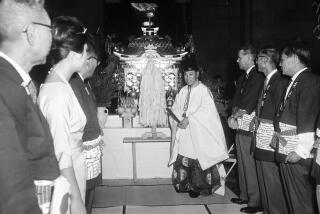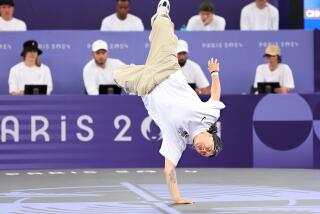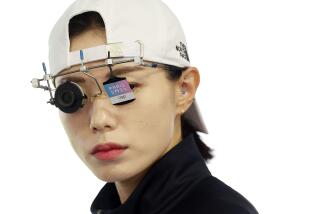The style, the grace -- the ice-cold politics
Reporting from Tokyo and Seoul — Wearing a sassy black dress, twisting and leaping to a medley of spy thriller songs, the queen of South Korean figure skating is continuing a quest her countrymen hope is no mission impossible:
Not just to win, but to beat the Japanese in the process.
Kim Yuna, the pouting 19-year-old monarch-on-ice, is poised to win South Korea’s first Olympic gold medal in figure skating -- a feat that for many countrymen would prove to be a satisfying athletic and political victory over their Asian neighbors.
Because when it comes to sports competitions against Japan, their colonial-era overlords from 1910 to 1945, Koreans wear their fiercest game faces -- whether on a baseball or soccer field, or even within the graceful realm of the figure-skating rink.
“With South Korea versus Japan, it is all about one-sided nationalism,” said Shin Kwang-yeong, sociology professor at Chung-Ang University in Seoul. “Of course, Japan’s colonization of Korea and emotions between the two countries are instilled in sports.
“It’s a phenomenon based on South Korea’s group perception about its traumatic history. If you do not win a gold medal, other medals are not satisfying.”
And medals are sweeter if snatched from a Japanese competitor.
South Koreans held their collective breath Wednesday as Kim competed in the event’s short program, her first step toward gold. For the broadcast here at 1 p.m., people flocked around TV screens in offices and department stores.
Once again, Kim did not disappoint -- giving a near-perfect performance that also set a world record. The performance gave her a commanding lead over Japanese arch-rival Mao Asada.
Viewers winced when, early in her program, Kim launched into a risky triple-lutz triple-toe combination jump. And they beamed when their teen hero’s record-setting scores were posted and Asada, who competed just before Kim, held her head in her hands as she fell into second place.
Korean ice skating fans know that the 19-year-old Asada is a formidable opponent.
In 2006, at age 15, she was considered the world’s best figure skater, winner of the 2006 Grand Prix Final and the first female skater to land two triple-axel jumps in the same program.
But Asada was also unlucky: She was born 87 days too late to meet the age requirement -- 15 years old by July 31 -- to compete in the last Winter Olympics. And many -- especially the Koreans -- think that Asada might have lost a step in her first Olympics.
Seoul taxi driver Park Byung-hee is following the figure skating on his dashboard television. He can almost taste Kim’s gold medal.
“Japan is different from other competitors in the U.S. or China,” he said. “There are these emotions between us. To beat Japan, our rival, is significant.”
By many accounts, Japanese fans are taking the Olympic figure-skating showdown no less seriously. The competition in Vancouver, Canada, grabbed more media attention Wednesday than Toyota Chairman Akio Toyoda’s appearance on Capitol Hill over the auto recall.
Machiko Yamada, 67, special advisor on figure skating at Chukyo University and Asada’s former childhood coach, dismissed the notion that politics plays a role on the ice or any other athletic field.
“I don’t think the girls have any of that political stuff on their mind. They just consider themselves rivals, in a good sense, as athletes,” she said. “They aren’t buddies, but they have a good relationship with each other.”
Although South Korea’s Kim has many fans in Japan, most of the loyal figure-skating watchers are rooting for a Japanese victory.
“If Mao can skate flawlessly in the free program and do the two triple axels she is planning on doing, I think she can beat Yuna,” said Emi Watanabe, 50, a former Japanese figure skater and World Championship medalist.
“Korea already has 10 medals. Japan hasn’t been able to get any gold medals. It’s kind of sad. The national mood is down with this Olympics because there has been a lack of gold medals.”
For Koreans, a Kim victory could go far to wash away the distaste of Olympics past.
Marathoner Sohn Kee-chung was the first Korean to win an Olympic gold medal at the 1936 Berlin Olympics. But at that time, Korea was a Japanese colony and Sohn was forced to compete under a Japanese name.
Now, Koreans compete as Koreans -- to the delight of their countrymen. Even North Korea sent two athletes to the Games.
“Whether it is baseball or figure skating, people are increasingly viewing sports in a nationalistic perspective. They think of standout athletes as a national symbol,” said Shin.
“Particular sports are feeding these interests, and subsequently a certain fanaticism is generated.”
And so two nations, albeit for different reasons, will be watching closely as Kim and Asada face off for the topmost space on the medals podium. Both skaters are opting for a classical theme.
Mao’s long-program accompaniment will be “Bells of Moscow” by Sergei Rachmaninoff, while Kim will skate to Concerto in F by George Gershwin.
But amid a national desire to be first, such high culture has disintegrated into something more akin to roller derby.
Before the figure skating event began, nationalistic tempers flared over the airtime given to Japanese speed skaters. The rift led to a South Korean broadcast network filing a complaint with Olympic officials over the video feed provided to networks worldwide.
Their beef: There was too much coverage of Japanese speed skaters while a Korean was racing toward a gold medal.
Nagano is a special correspondent. Ju-min Park of the Times’ Seoul Bureau contributed to this report.
More to Read
Sign up for Essential California
The most important California stories and recommendations in your inbox every morning.
You may occasionally receive promotional content from the Los Angeles Times.











